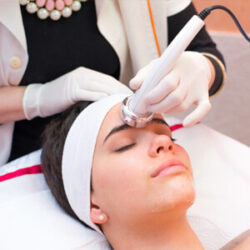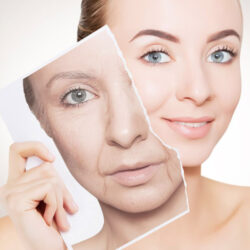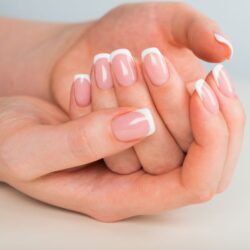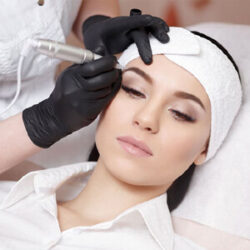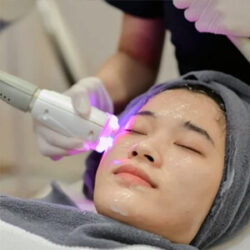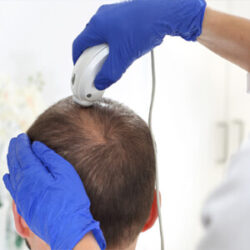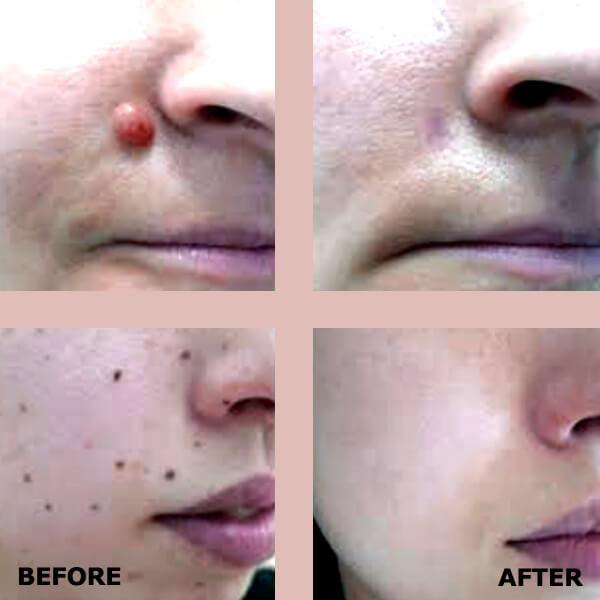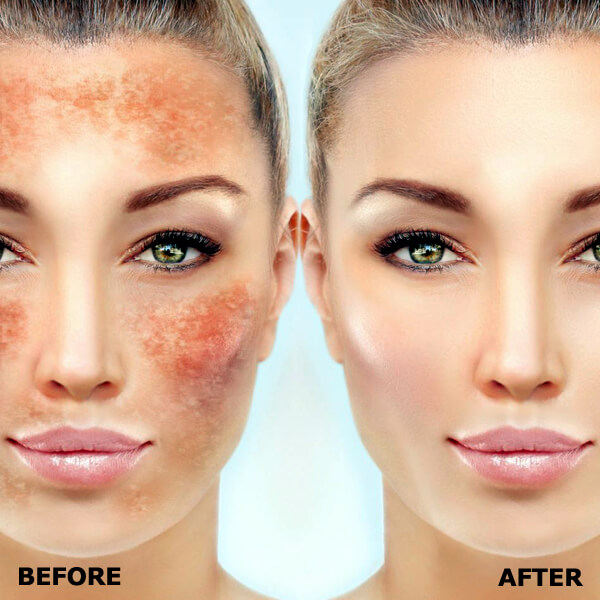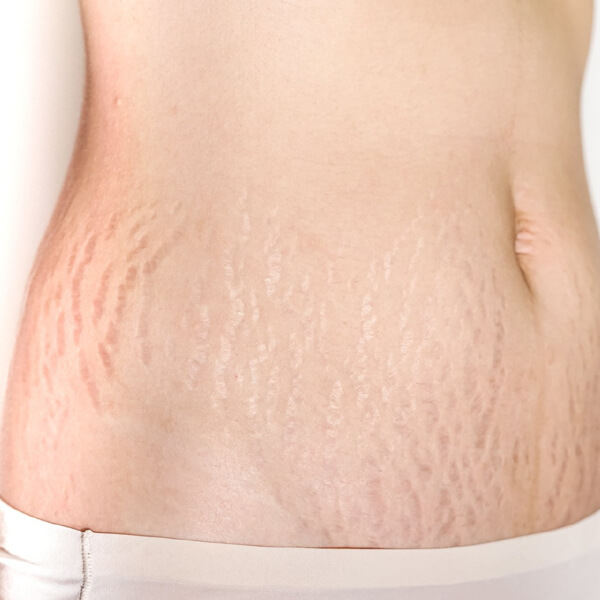1. What causes acne?
The combination of oil buildup with dead skin cells and bacterial invasion results in acne formation. Acne breakouts usually happen due to hormonal changes, stress, high humidity, inherited genetic traits, using products that are comedogenic, and specific dietary factors.
2. What are the popular acne treatments in Patna for effective results?
The most sought-after treatments include:
- Advanced laser therapy (serves as a leading solution for treating acne scars)
- Customized topical and oral medications (including antibiotics, isotretinoin, azelaic acid, benzoyl peroxide)
- Chemical peels
- MNRF (Microneedling Radio Frequency)
- PRP (Platelet-rich Plasma) therapy
- Hormonal acne management
- Minimally invasive procedures for acne marks and scars.
Our acne treatment clinic provides patients with a full spectrum of services including topical and oral acne medications, advanced laser treatment for acne scars in Patna as well as specialized acne marks treatment, targeted acne spot treatment, hormonal acne treatment, cystic acne management, and comprehensive solutions for facial, chest, and back acne.
You might also be prescribed combination treatments depending on the severity and nature of acne scars. The combination of evidence-based treatments leads to superior results for both active acne and post-acne scarring when implemented strategically.
3. How long does treatment take to work?
- Topical treatments: 4–8 weeks for visible improvement.
- Oral medications: Extends between 6-12 weeks.
- Laser procedures: Deliver instant improvements while patients achieve optimal results after undergoing 3–6 sessions.
4. Is acne treatment painful?
The majority of treatments have well-tolerated experiences with minimal pain for patients. The treatment of advanced laser therapy produces a warm sensation while extractions may lead to minor temporary discomfort.
5. What is the downtime after acne treatment at R Square Clinic?
The majority of treatments need either a short recovery period or no recovery time at all. And if you’re wondering what to expect after laser treatments, know that it usually result in mild redness that lasts between 24-48 hours and topical treatments let patients resume their daily routines right away.
6. What are the acne treatment results?
The majority of patients achieve between 60% to 80% reduction in their active acne within an 8- to 12-week period and their skin texture improves, scarring decreases, and acne marks become less noticeable over time.
7. How much does acne treatment cost?
Acne treatment cost fluctuate according to both the severity of the condition and the selected treatment approach. We create personalized treatment strategies to accommodate different financial budgets and patient requirements.
8. What treatment permanently removes acne?
A combination of hormonal management with targeted medications and regular maintenance allows patients to achieve long-term control of their acne while maintaining clear skin but there exists no permanent “cure” for acne.
9. What is the very best treatment for acne treatment in Patna?
The best results from acne treatment can be achieved using personalized topical treatments alongside appropriate oral medications (when needed) and customized advanced laser therapy according to individual skin type and acne severity.
10. What laser is best for acne treatment?
Fractional CO2 lasers and diode lasers prove highly effective for treating active acne and reducing scars by selecting appropriate wavelengths for individual skin issues and treatment goals.
11. Can acne be cured permanently?
People who want to maintain clear skin after successful acne treatment often need maintenance therapy because some individuals need ongoing treatment to stop new breakouts from occurring. While you can’t cure it permanently, it is entirely possible to manage and control acne long term.
12. Does diet affect acne?
Susceptible people with acne symptoms tend to experience increased severity when consuming high-glycemic foods, dairy products, and processed foods. Following an anti-inflammatory diet will help skin appear clearer and make treatments more effective.
13. How do I prevent acne scars?
- Avoid picking or squeezing pimples
- Begin early treatment to reduce inflammation
- Use broad-spectrum sunscreen daily to prevent hyperpigmentation
- Following skincare advice provided by the dermatologist
14. Are acne treatments safe for sensitive skin?
Absolutely. Our dermatologists create customized treatment plans for sensitive skin patients by using mild yet effective techniques. These treatments prioritize very less irritation along with optimal results.
15. What foods should I avoid if I have acne?
Acne symptoms tend to worsen when people consume foods with high sugar content and processed items that have high glycemic indexes. The main reason for this is that these foods trigger inflammatory reactions in the body while leading to insulin spike which results in increased oil secretion and pore blockage that intensifies acne.

Acne Treatment Options in Patna
R Square Skin, Hair, Nail Clinic provides locales and patients in nearby areas with complete acne treatment in Patna, utilizing advanced dermatological services along with personalized treatment plans as per each patient’s skin requirements. As the best dermatologist for acne in Patna, Dr. Rizwana Barkat begins with a complete evaluation to select the best treatment approach for your particular skin condition.
Topical Treatments – The treatment involves applying prescription-strength retinoids, benzoyl peroxide, and antibiotics applied directly to the skin to fight inflammation and bacterial growth. Our acne specialist in Patna prescribes personalized skin care applications that complement your skin type and acne severity level.
Oral Medications: Our best acne doctor in Patna will prescribe oral antibiotics or hormonal therapy or isotretinoin to patients who have moderate to severe acne for internal acne control and prevention of future outbreaks.
Chemical Peels: The professional chemical peel for acne in Patna removes dead skin cells while it cleans pores, decreases active acne breakouts, and enhances skin appearance.
Laser Therapy: The non-invasive laser acne treatment in Patna uses advanced technology to fight acne-causing bacteria while decreasing oil production for patients with persistent acne with minimal recovery time.
Photodynamic Therapy: The innovative pimple treatment in Patna uses light-activated solutions to destroy acne bacteria and shrink sebaceous glands, which makes it an effective solution for treating severe inflammatory acne.
Comedone Extraction: The trained specialists at our skin clinic in Patna perform comedone extraction to safely remove blackheads and whiteheads which helps prevent inflammation and infection from occurring.
Acne Scar Treatment in Patna
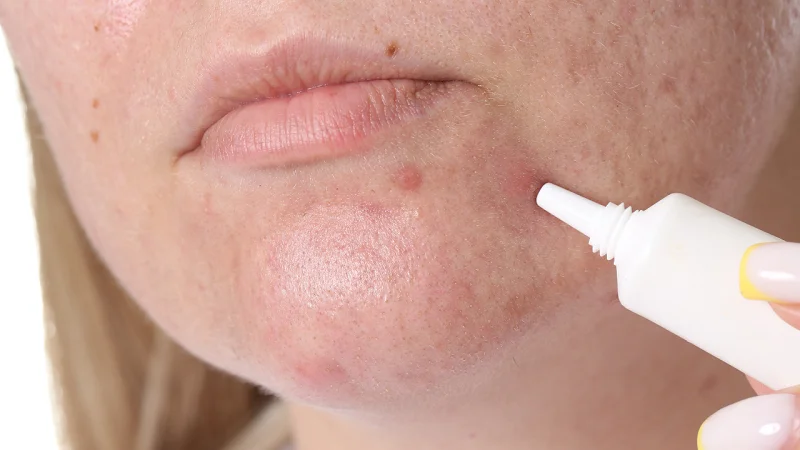
At R Square Clinic, after we’re done with the acne removal, our specialists move forward with the acne scar treatment to remove residual scarring and achieve a smooth and healthy looking skin health. Our best dermatology clinic in Patna provides patients with state-of-the-art scar revision techniques for their skin needs.
Microneedling RF: The treatment method known as Microneedling RF uses radiofrequency energy with micro-needling, which stimulates deep skin collagen production for effective atrophic acne scar reduction and better skin texture.
Laser Resurfacing: Laser treatment for acne scars in Patna uses fractional CO2 or erbium lasers to resurface damaged skin layers, which leads to new collagen formation and major scar reduction.
Chemical Peels for Scars: As the best acne treatment clinic in Patna, R Square offers medium to deep chemical peels which help patients achieve better skin texture by removing post-inflammatory hyperpigmentation. This treatment will also help you smooth out shallow acne scars through controlled exfoliation.
Dermal Fillers: The use of dermal fillers as an injectable treatment helps patients achieve immediate skin contour improvement while stimulating natural collagen for lasting benefits.
Subcision: The surgical procedure of subcision helps patients by releasing fibrous bands beneath depressed scars, which causes their skin to lift naturally while creating space for new collagen formation.
Q-Switched Laser: The Q-Switched laser system targets acne marks removal in Patna by breaking down melanin deposits in hyperpigmented scars without damaging surrounding tissue, which makes it suitable for patients with darker skin tones that is common in Bihar.
Step-by-Step Process
- Initial Consultation: Comprehensive skin analysis and medical history review to identify acne triggers and severity
- Treatment Plan Development: Customized combination approach based on your specific acne type and skin characteristics
- Pre-Treatment Preparation: Skin cleansing and preparation with medical-grade products to optimize treatment efficacy
- Treatment Application: Administration of chosen therapy—whether topical, oral, laser, or procedural—by trained professionals
- Post-Treatment Care Instructions: Detailed guidance on home care, product recommendations, and lifestyle modifications
- Progress Monitoring: Regular follow-up appointments to assess improvement and adjust treatment as needed
Timeline for Results
Understanding the timeline for acne treatment results helps set realistic expectations and maintain commitment to your skincare journey. Here’s what you can expect:
1. Topical Treatments and Oral Medications
Initial improvements typically visible within 4-6 weeks, though complete clearing may require 3-4 months of consistent use for optimal results
2. Cystic Acne Treatment in Patna
More aggressive therapies might take longer but deliver more dramatic results, with significant improvement appearing after 2-3 months of dedicated treatment.
3. Chemical Peels for Acne
Visible improvement after the first session, with optimal results appearing after a series of 4-6 treatments spaced 2-4 weeks apart.
4. Laser Acne Treatment in Patna
Usually requires multiple sessions—typically 4-8 treatments—with noticeable reduction in breakouts after the second or third session.
5. Microneedling RF and Laser Resurfacing
Progressive improvement over 3-6 months as collagen remodeling occurs beneath the skin surface.
6. Dermal Fillers for Scars
Provide immediate but temporary results lasting 6-12 months, with touch-ups recommended to maintain correction.
Our best acne treatment clinic in Patna emphasizes that patience and consistency are key to achieving and maintaining clear skin in Bihar’s climate.
Follow-Up Care
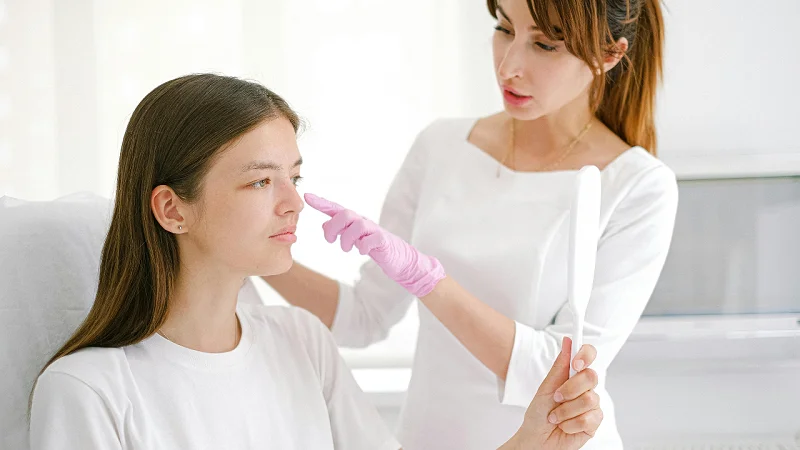
Successful acne management extends beyond the treatment room, requiring ongoing care and support from your dermatologist in Patna:
- Regular Monitoring Appointments: Scheduled follow-ups every 4-6 weeks to monitor progress, address concerns, and refine your treatment approach based on your skin’s response
- Treatment Adjustments: Necessary modifications made based on how your skin responds and any changes in your condition throughout the treatment journey
- Personalized Aftercare Instructions: Detailed guidance on recommended cleansers, moisturizers, and sun protection specifically suited to treated skin and Patna’s climate
- Progress Documentation: For patients undergoing acne scar treatment in Patna, clinical photography tracks improvements over time and helps measure treatment efficacy
- Continuous Support: Our team remains accessible between appointments to address any questions or concerns that arise during your treatment
- Education on Maintenance: Guidance on proper skincare routines, dietary considerations, and stress management techniques particularly relevant to life in Patna and Bihar
- Long-Term Maintenance Plans: Periodic treatments scheduled to prevent future breakouts and maintain skin clarity, ensuring your investment in clear skin continues to pay dividends
At our skin clinic in Patna, we’re committed to supporting you throughout your entire acne treatment journey and beyond.
What to Expect During Acne Treatment in Patna
R Square Skin, Hair, Nail Clinic delivers individualized acne treatment services which help patients achieve their goal of getting clear and healthy skin.
Your first step at R Square Skin, Hair, Nail Clinic involves a detailed assessment with our dermatologist who will evaluate your skin condition, review your medical background, and lifestyle elements that might lead to acne.
Our clinic provides teenage acne treatment in Patna as well as adult acne treatment in Patna because acne affects people differently at different stages of life.
Your acne specialist at Phulwari Sharif, Patna will explain your acne causes to help you determine whether it’s hormonal, inflammatory, or cystic acne before creating a personalized treatment plan.
Our clinic provides complete patient education about their condition and available treatment choices to maintain their confidence and knowledge base during the entire process. The clinic provides patients with a comfortable environment through its modern facilities and strict hygiene protocols which ensure their safety and optimal treatment outcomes.
Schedule your appointment today to notice real difference in acne-prone skin!

